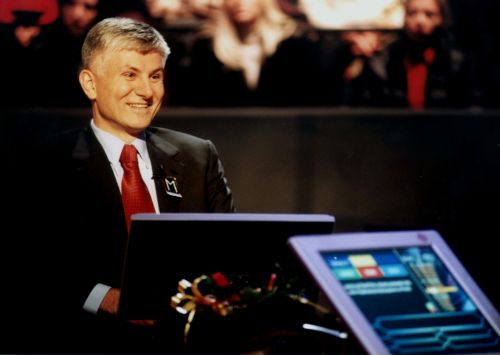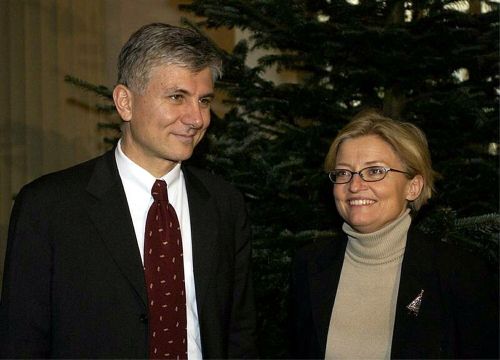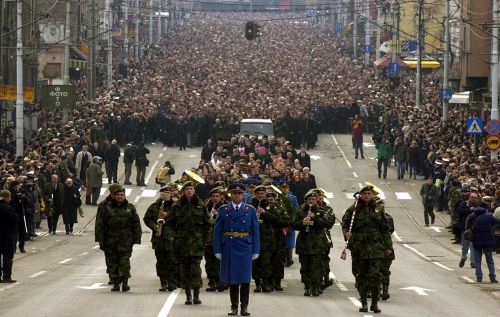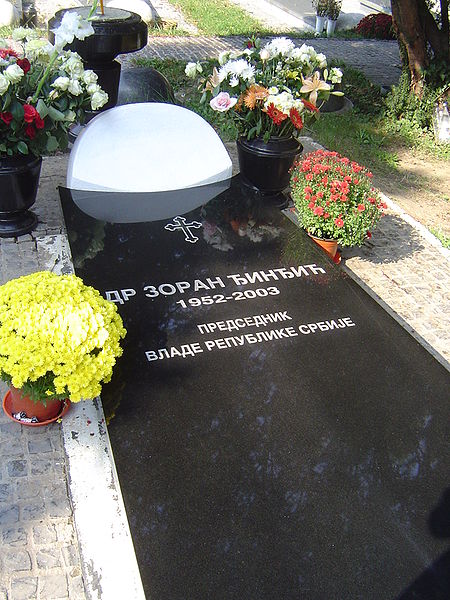<Back to Index>
- Naturalist Jean-Baptiste Pierre Antoine de Monet, Chevalier de la Marck, 1744
- Novelist Herman Melville, 1819
- Prime Minister of Serbia Zoran Đinđić, 1952
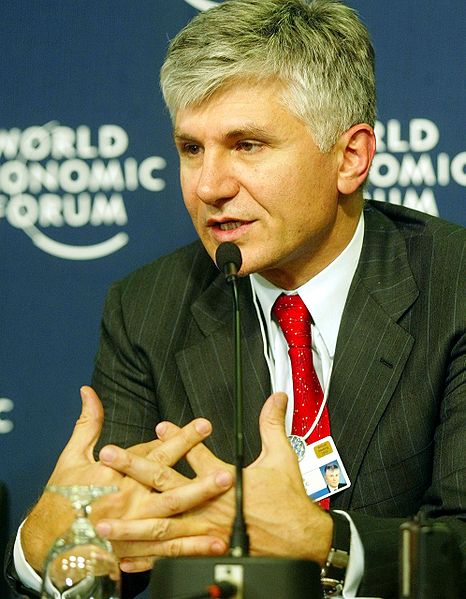
Zoran Đinđić, Ph.D. (often Zoran Djindjić, from Serbian Зоран Ђинђић) (1 August 1952 – 12 March 2003) was a Serbian prime minister, mayor of Belgrade, long-time opposition politician and a philosopher by profession.
Đinđić was one of the founders of the modern Democratic Party and became its president in 1994. During the 1990s, he was one of the leaders of the opposition to the regime of Slobodan Milošević, and became Prime Minister of Serbia in 2001 after the overthrow of Milošević. As Prime minister, he advocated pro-democratic reforms and European integration of Serbia. He was assassinated in 2003 by the members of Serbian organised crime. Đinđić was born in Bosanski Šamac, Bosnia and Herzegovina, FPR Yugoslavia, where his father had been stationed at the time as an officer of the Yugoslav People's Army (JNA). Đinđić's family, on his father's side, originated from Toplica in the southern region of Serbia. His
mother Mila Dušanić, a housewife, raised him and his elder sister
Gordana in various places wherever it was that the father's job took
the family. Ten years of Zoran's childhood were spent in the town of Travnik. Eventually, his father gained a post in Belgrade, and the family moved to the capital. There, Zoran Đinđić attended Ninth Belgrade Gymnasium, and later studied philosophy at the University of Belgrade,
graduating in 1974. It was during university days that he developed an
interest in politics. After being convicted by the communist regime and
through Party-controlled media for his role in attempting to organize an independent political movement of Yugoslav students, Đinđić left for West Germany helped by former German Chancellor Willy Brandt, who
persuaded authorities to let Đinđić come to Germany instead of serving
his sentence in Yugoslavia. He continued his studies with professor Jürgen Habermas in Frankfurt. In Germany, Đinđić obtained a Ph.D. in philosophy from the University of Konstanz in 1979. He became proficient in German, unlike English, which he mastered later, while serving as Serbian prime minister. Đinđić was married to Ružica, with whom he had a daughter and a son, Jovana and Luka, both minors at the time of his death. In 1989, Đinđić returned to SFR Yugoslavia to take a teaching post at the University of Novi Sad, and on December 11, 1989 together with other Serb intellectuals and pro-democracy activists he founded the liberal Democratic Party (DS) based on the similarly conceptualized party that existed in the Kingdom of Yugoslavia. He became the party's Executive Board Chairman in 1990, and got elected to the Parliament of Serbia the same year. In 1993 he replaced Dragoljub Mićunović as President of the Democratic Party. After a massive series of public protests over election fraud perpetrated by the central government under Slobodan Milošević during the winter 1996–1997, Đinđić became Mayor of Belgrade, the first non-communist mayor to hold that post after the Second World War. United only by their political enemy, the coalition "Zajedno" (Together) withVuk Drašković's SPO and Vesna Pešić's GSS collapsed only four months after their victory. Đinđić was voted out of his position as Belgrade mayor by the SPO, SPS and SRS. Đinđić
and his party boycotted the 1997 Serbian presidential and parliamentary
elections, as did others in the "democratic bloc" including Vojislav Koštunica's Democratic Party of Serbia. This caused the Socialists and Radicals to sweep most of the seats, leaving the third largest portion to Vuk Drašković's
SPO. The boycott helped force a second set of elections when the
second round was ruled to have had insufficient turnout. Serbian law at
the time mandated at least 50% turnout for a president to be elected. In this case, Vojislav Šešelj won the second round against the Socialists' Zoran Lilić; when the election was re-run, Šešelj lost to the Socialists' Milan Milutinović. This caused Šešelj to allege electoral fraud and lead protests against the government. He changed his mind however when the Kosovo crisis began
in early 1998, and his Radicals joined the government as a coalition
partner. When Vuk Drašković joined the Yugoslav government in early
1999, Đinđić became Serbia's main opposition leader as NATO's war began against Yugoslavia. After former secret policeman, anti-regime publisher and journalist Slavko Ćuruvija was murdered on Orthodox Easter during NATO bombing of Yugoslavia, Đinđić sought safety and fled to temporary exile in Montenegro, allegedly because he was next on the assassination list of then-President Slobodan Milošević's secret service. In September 1999, Đinđić was named by Time magazine as one of the most important politicians at the beginning of the 21st century. Photos of his handshake with Bill Clinton at the
time of the bombings have been used to portray him as a traitor, as
well as by the opposition to show his and accordingly Belgrade's
possible international recognition. Upon his return to the country in
July 1999, Đinđić was charged with endangering state security in a
trial that was closed to the public and subsequently found out to be
rigged. A series of mysterious assassinations included the shooting of Yugoslav Defence Minister Pavle Bulatović on
7 February 2000 in a restaurant. Serbian Radical Party leader Vojislav
Šešelj maintained during his testimony at the Slobodan Milošević trial
that this murder was carried as a prelude to the successful hijacking
of the Montenegrin People's Party in October 2000 by Predrag Bulatović, who successfully reversed the parliamentary majority won by Milošević
and his allies, moving his party in alliance with Đinđić's Democratic Opposition of Serbia (DOS). In April, JAT chairman and Yugoslav United Left member Žika Petrović was gunned down as he was walking his dog. In late August, former Serbian President Ivan Stambolić disappeared; he had been murdered on Fruška Gora mountain by members of Serbia's Special Operations Unit.
Đinđić and his allies openly accused Milošević of these events either
by claiming that he had either ordered them or was no longer able to
maintain control and should therefore step down. Đinđić played a prominent role in the September 2000 presidential elections in the Federal Republic of Yugoslavia and in the 5th October uprising that
overthrew the Milošević regime. While the nationalist Koštunica
headlined the effort in October, Đinđić lead the broad-based 19-party Democratic Opposition of Serbia coalition to its victory in Serbian elections of December 2000. He became the Prime Minister of Serbia on 25 January 2001. In 2001, Đinđić played a key role in sending Milošević to the ICTY in The Hague.
Later, Đinđić said that he became disillusioned with the protracted
trial of Milošević, qualifying it as a "circus". Đinđić said the court
in The Hague was "allowing Milošević to behave like a demagogue and to
control the trial". In August 2001, after meeting with Koštunica's cabinet, former Serbian State Security officer Momir Gavrilović was
murdered. Koštunica claimed that Gavrilovic was briefing his cabinet
about connections of some members of Serbian government with organized
crime. This caused Koštunica and his 45 DSS members of parliament to
withdraw from DOS and the government. Đinđić attempted to expel the DSS
members from parliament, referring to the existence of imperative mandate that
places all deputies under the control of the party elected to
parliament. Meanwhile, Koštunica and his party openly accused Đinđić of
involvement with organised crime.
Đinđić was received favorably by Western nations. His meetings with Western leaders George W. Bush, Tony Blair, Jacques Chirac and
others strongly indicated that the West supported his politics. Đinđić
had constant disagreements with his ex-coalition partner and
then-Yugoslav federal president Vojislav Koštunica, who was his biggest
political rival in Serbia itself. His earlier close relationship with
Montenegrin president Milo Đukanović had also cooled because of Đukanović's aspiration for an independent Montenegro state. Đinđić
was determined to clean Serbia from organized crime, and created the
"Special Tribunal" with a witness protection program. This alarmed
organized crime leaders who were intertwined with elements of the
Serbian secret police that
were still loyal to ousted President Slobodan Milosevic. At the order
of former commander of the Special Operations Unit of Yugoslavia's
secret police, Milorad "Legija" Ulemek, Đinđić was assassinated by Ulemek's soldier Zvezdan Jovanović in
Belgrade on March 12th, 2003. Jovanović shot him from the building
across from the main Serbian government building at 12:23 PM, hitting
him once in the chest. The high-power bullet of a Heckler & Koch G3 assault rifle penetrated his heart and killed him almost instantly. He
was rushed to a hospital where he was treated, but pronounced dead one
hour later. Milorad "Legija" Ulemek was blamed as the mastermind of the
crime. Ulemek was also one of the leading persons in the "Zemun clan",
a leading organized crime group in Serbia. He was later prosecuted and
convicted of being involved in some of the mysterious assassinations
and assassination attempts that marked Yugoslavia in the months before
Đinđić took power. Nataša Mićić, then acting President of Serbia, declared a state of emergency immediately. Zoran Živković was elected by the Serbian Democratic Party as Đinđić's successor. On May 23, 2007, twelve men were convicted for the assassination of Zoran Đinđić. Among
the convicted defendants was former policeman Milorad "Legija" Ulemek,
who, during the four years preceding the murder of Zoran Đinđić, had
travelled to Switzerland, Austria, the Republic of Macedonia, Greece,
Singapore and Croatia using a fraudulent passport that had been one of
a batch of blank passports stolen from the Croatian Consulate in Mostar
(Bosnia and Herzegovina) in 1999. Ulemek,
along with Zvezdan Jovanovic, was charged with being the ringleader of
the assassination plot carried out on 12 March 2003, when Zoran Đinđić
was fatally shot by a sniper while getting out of his official car
outside government buildings in Belgrade. Five
of twelve men convicted are still on the run and remain the subject of
INTERPOL Red Notices.
